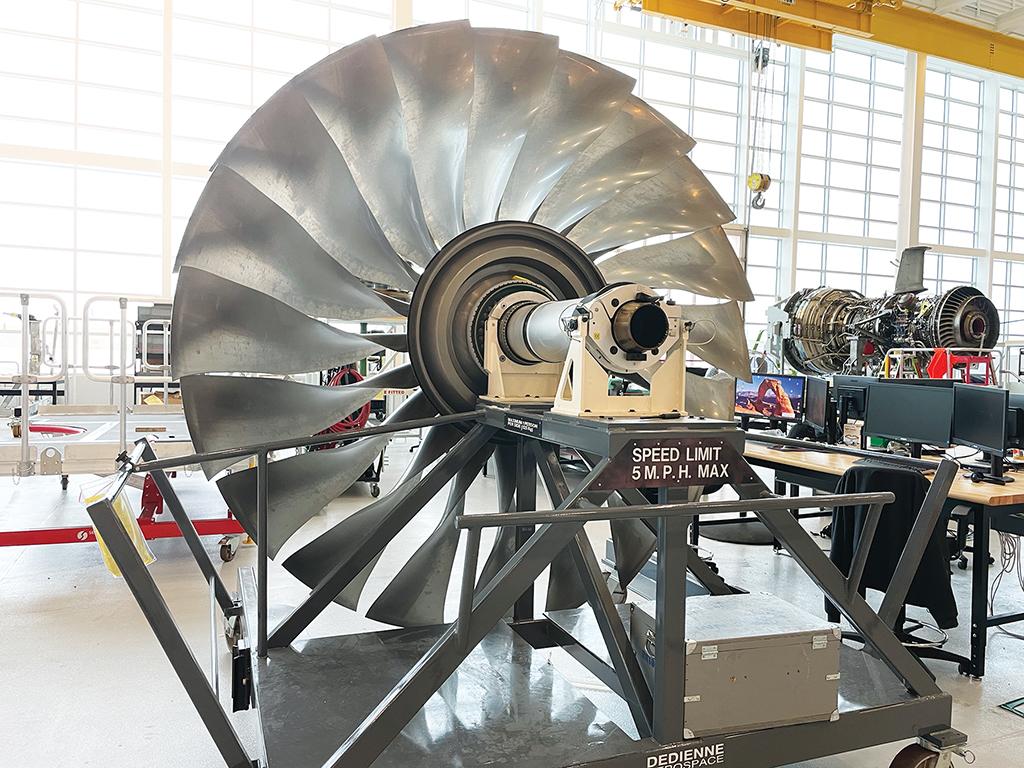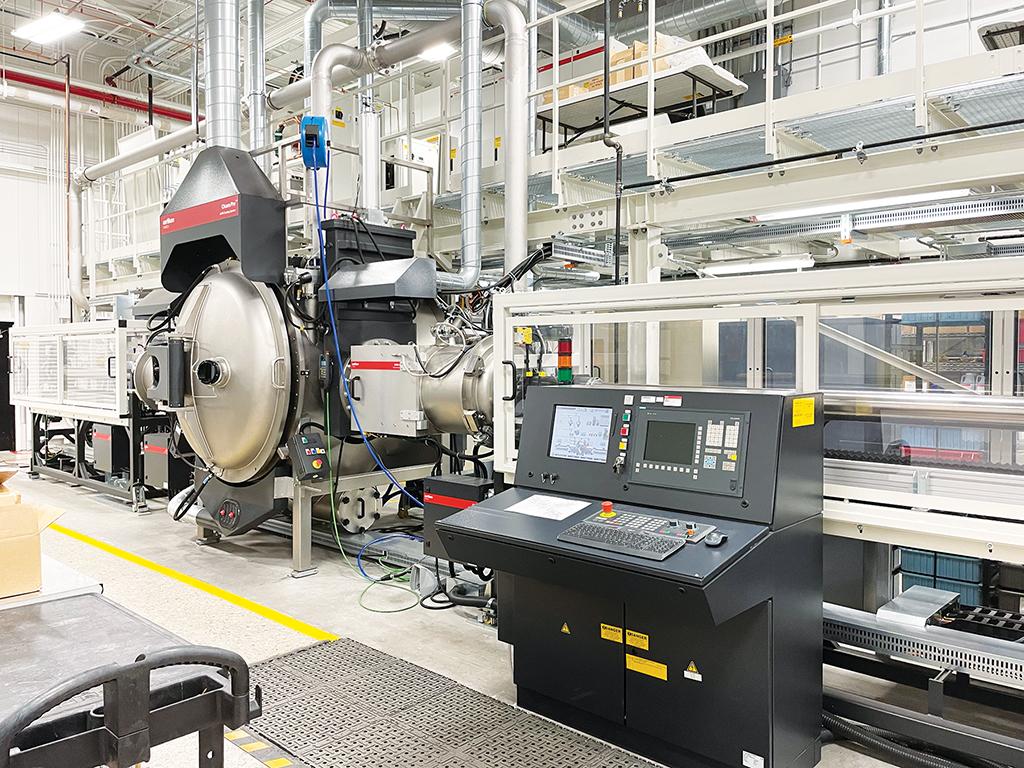
Delta Air Lines’ investment of $100 million in a 150,000-lb.-thrust test cell not only has paved the way for building its next-generation engine capabilities and powerful OEM powerplant partnerships with Rolls-Royce and Pratt & Whitney, it also has ushered in the MRO provider’s evolution, which the COVID-19 pandemic accelerated.
While the new test cell for engines drew the pomp and circumstance in February 2019, the addition of machines to clean, mill, braze, grind and optically measure has accelerated high-tech maintenance such as nozzle guide-vane repairs and 3D repairs on composite Rolls-Royce fan blades. “We’ve really concentrated our effort to transition into higher-tech repairs than we used to send out,” says Mike Moore, senior vice president for maintenance operations at Delta TechOps & MRO Services Group. Doing so has increased quality control while decreasing turnaround time, costs and logistics requirements.
He says the expanded 27,000-ft.2 hot-section repair shop, which opened at the same time as the test cell, is “reaping benefits” related to repair work for new Rolls-Royce and Pratt & Whitney engines. “We’re starting to think about how we can grow that business even faster because demand is there,” Moore says, noting that capacity at the shop is already getting tight.
While many of the repairs are for the new Trent and geared turbofan engines, Delta also will use the new machines to repair mature engines it maintains such as the CFM56, GE CF6 and Pratt & Whitney PW2000 and PW4000.
Delta’s 25-year MRO contracts with the engine OEMs cover Rolls’ Trent 1000, 7000 and XWB engines and Pratt’s PW1100G and PW1500G. Delta has chosen the Trent 7000 to power its Airbus A330-900neos, the Trent XWB for its A350s, the PW1100G to power its A321neos and the PW1500 for its A220s.
While Delta already repairs life-limited parts (LLP), gearboxes and engine blades, the repairs are spread out through its facility, so it is planning to create centers of excellence for each. The gearbox center of excellence is slated to open in the second half of 2022, the LLP center of excellence by the end of 2022 and the blade shop by 2023.
This major engine shop investment has positioned Delta TechOps for the future with new capabilities—but it has come at a hefty cost. However, in 2019, “the MRO did more [third-party] customer engines than Delta engines for the first time,” says Don Mitacek, senior vice president for technical operations at Delta Air Lines. “That tipping point will never go back.” The new engine shop and test cell were predicated on third-party customer work. “We used to just sell open shop space,” he adds.

Delta also will build a new test cell for Pratt & Whitney’s geared turbofan engines. Moore says it is in the design phase and should open in 2023.
The MRO provider also has its eye on expanding its component business. Before COVID-19, it was trying to “figure out how to play in the space and make a difference—and now we’re starting to see a lot of traction,” says Moore. “We think we’ll be able to double our component business in the next few years. It’s picking up that fast.”
While Delta TechOps already offers a fairly large catalog of component repairs, traditionally they were mostly for legacy Boeing products, so for the “last several years we’ve been investing in the Airbus side of the equation,” says Moore.
He says Delta TechOps is “working with OEMs” to forge deals for airframe and avionics repairs similar to what it has with Rolls and Pratt for engines. “We already do a lot of avionics test and repair, but we want to do Level 3 repairs [repairing circuit boards], and on newer components that’s a harder place to penetrate so we’re working with OEMs on that,” says Moore.
But like the engine shop expansion, moving into servicing those higher-tech components will come at a cost—at a time when airlines are losing money—-and Delta TechOps, as with most MROs, probably will not recover to 2019 revenue levels until 2023 or 2024.
However, Mitacek says a key message is that “our CEO [Ed Bastian] has been very supportive of the MRO’s growth—and we’re in a really good position to grow the business and service our customers” with capabilities that span an aircraft’s life cycle, including “soft services” such as predictive maintenance and reliability and material programs.
Meshing Divisions
The COVID-19 pandemic forced aviation companies to analyze their business structure and costs. Delta found that operating TechOps, Delta Material Services (DMS) and Delta Flight Products as separate entities not only was inefficient but also caused each to go to the market as a different group with a different voice, sometimes even competing against each other.

“We wanted to elevate our services and products and do so [in a way that is] less costly,” says Mitacek. Now there is one human resources department, one finance team and one sales team, “so we get synergies of the business and resources,” he says.
For example, before COVID-19, “we had a lot of different material-planning organizations, and by bringing DMS into the fold, we are looking at our needs [as] one group,” says Moore. DMS is also managing all of the part-outs and subsequent repairs; in the past, this was spread across multiple groups.
Sonny Stern leads the overall sales organization, instead of just the MRO side, and can now bundle services “that we may have not seen before,” Mitacek notes.
“We provide the full life cycle and can string it into one narrative that is more powerful,” says Moore.
The airline industry’s choppy recovery—with brief rebounds then sudden stops—has affected the MRO’s planning as well. “We’ve been in this peaky demand for quite some time, and we as an organization have really learned from that. Frankly, I think it has made us a more effective and efficient organization. Flexibility is key,” says Mitacek.
He thinks flexibility will be crucial for TechOps’ functioning and for capturing market share as the industry recovers.
“Delta sees TechOps as a competitive advantage. We have the oldest and most diverse fleet but the best on-time performance, the best reliability and do it all at the lower cost per seat mile. It really is a competitive advantage of ours. It was a bright spot last year. We want to continue to build that business, so I see Delta TechOps coming out of this even stronger,” says Mitacek.




